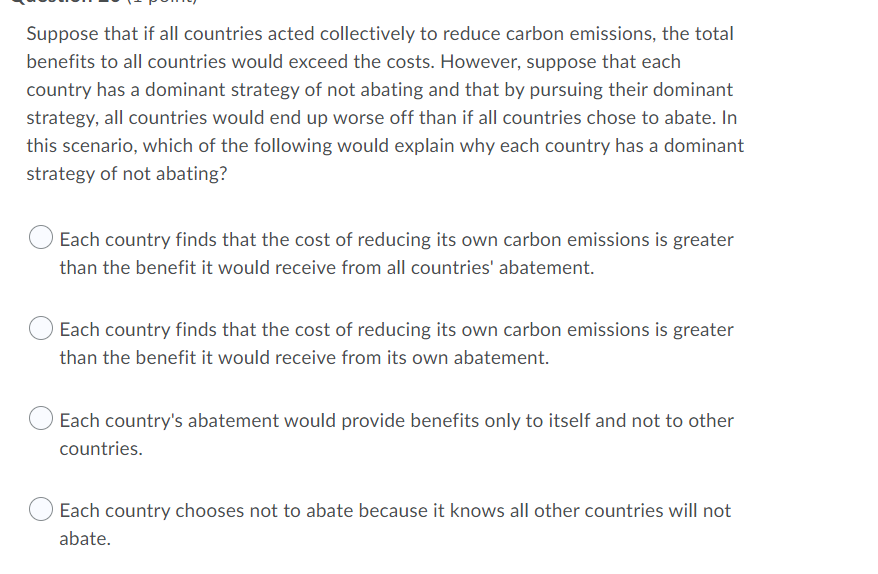Suppose that if all countries acted collectively to reduce carbon emissions, the total benefits to all countries would exceed the costs. However, suppose that each country has a dominant strategy of not abating and that by pursuing their dominant strategy, all countries would end up worse off than if all countries chose to abate. In this scenario, which of the following would explain why each country has a dominant strategy of not abating? Each country finds that the cost of reducing its own carbon emissions is greater than the benefit it would receive from all countries' abatement. Each country finds that the cost of reducing its own carbon emissions is greater than the benefit it would receive from its own abatement. Each country's abatement would provide benefits only to itself and not to other countries. Each country chooses not to abate because it knows all other countries will not abate.
Suppose that if all countries acted collectively to reduce carbon emissions, the total benefits to all countries would exceed the costs. However, suppose that each country has a dominant strategy of not abating and that by pursuing their dominant strategy, all countries would end up worse off than if all countries chose to abate. In this scenario, which of the following would explain why each country has a dominant strategy of not abating? Each country finds that the cost of reducing its own carbon emissions is greater than the benefit it would receive from all countries' abatement. Each country finds that the cost of reducing its own carbon emissions is greater than the benefit it would receive from its own abatement. Each country's abatement would provide benefits only to itself and not to other countries. Each country chooses not to abate because it knows all other countries will not abate.
Chapter28: International Trade
Section: Chapter Questions
Problem 1P
Related questions
Question

Transcribed Image Text:Suppose that if all countries acted collectively to reduce carbon emissions, the total
benefits to all countries would exceed the costs. However, suppose that each
country has a dominant strategy of not abating and that by pursuing their dominant
strategy, all countries would end up worse off than if all countries chose to abate. In
this scenario, which of the following would explain why each country has a dominant
strategy of not abating?
Each country finds that the cost of reducing its own carbon emissions is greater
than the benefit it would receive from all countries' abatement.
Each country finds that the cost of reducing its own carbon emissions is greater
than the benefit it would receive from its own abatement.
Each country's abatement would provide benefits only to itself and not to other
countries.
Each country chooses not to abate because it knows all other countries will not
abate.
Expert Solution
This question has been solved!
Explore an expertly crafted, step-by-step solution for a thorough understanding of key concepts.
This is a popular solution!
Trending now
This is a popular solution!
Step by step
Solved in 2 steps

Knowledge Booster
Learn more about
Need a deep-dive on the concept behind this application? Look no further. Learn more about this topic, economics and related others by exploring similar questions and additional content below.Recommended textbooks for you

Exploring Economics
Economics
ISBN:
9781544336329
Author:
Robert L. Sexton
Publisher:
SAGE Publications, Inc

Exploring Economics
Economics
ISBN:
9781544336329
Author:
Robert L. Sexton
Publisher:
SAGE Publications, Inc